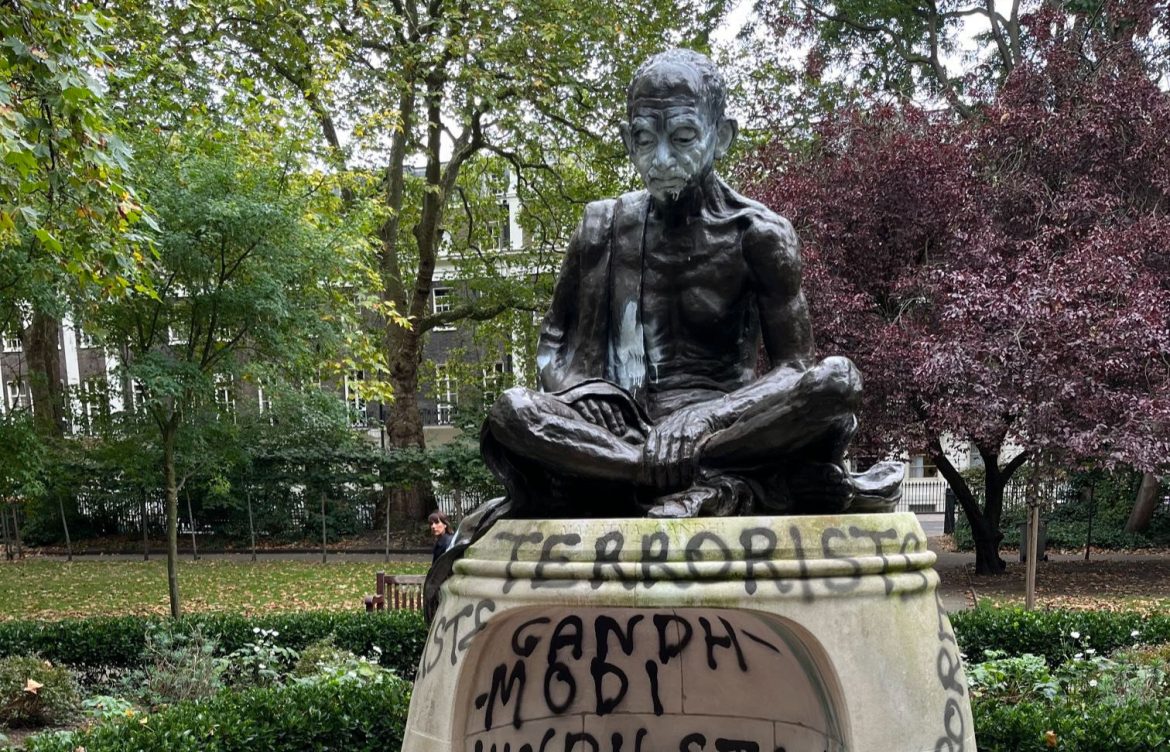Statue in Tavistock Square Damaged
Authorities in the United Kingdom have launched an investigation after the statue of Mahatma Gandhi in London’s historic Tavistock Square was vandalized by unidentified individuals.
The incident occurred only days before 2 October, when India observes Gandhi Jayanti to mark the leader’s birth anniversary. The date is also recognized worldwide as the United Nations International Day of Non-Violence.
Indian Reaction: “An Attack on Non-Violence”
According to reports in Indian media, the vandalism was not accidental but a deliberate attempt to deface the monument.
In a statement, the Indian High Commission in London described the act as “shameful” and “an attack on the global message of non-violence.”
The Commission emphasized that the timing of the incident was particularly distressing:
“At a moment when the world is preparing to pay tribute to Gandhi as a symbol of peace, tolerance, and non-violence, such actions are deeply condemnable.”
Officials urged British authorities to take swift action against those responsible and called for the immediate restoration of the statue.
Metropolitan Police Begin Inquiry
The Metropolitan Police confirmed that an investigation is underway. Officers are gathering evidence from the site, including surveillance footage, to identify those involved.
A spokesperson said the authorities are determined to hold the perpetrators accountable, stressing that hate-motivated or politically charged vandalism will not be tolerated in London.
Historical Significance of the Statue
The bronze statue of Mahatma Gandhi in Tavistock Square was created in 1968 by artist Fredda Brilliant, a Polish-born sculptor known for her portraits and monuments.
The statue was commissioned to recognize Gandhi’s links to University College London (UCL), where he studied law in the late 19th century.
Tavistock Square itself has long been a place of remembrance. It is home to several memorials dedicated to peace and anti-war campaigns, making the Gandhi statue a central symbol of non-violence in the heart of London.
Similar Incidents Abroad
The vandalism in London is not an isolated case. In recent years, statues of Gandhi in other countries have also been targeted.
-
In Italy, a Gandhi statue was defaced with graffiti referencing Hardeep Singh Nijjar, a Sikh separatist leader linked to the Khalistan movement.
-
In the United States, Gandhi memorials have faced damage and protests, often linked to political disagreements surrounding his legacy.
These incidents have sparked debate over Gandhi’s global symbolism. While he is celebrated internationally as an icon of peace and civil resistance, critics have occasionally raised concerns over his complex political and social views.
Broader Context: Gandhi’s Legacy
Mahatma Gandhi remains one of the most recognizable figures of the 20th century. His philosophy of non-violent resistance (satyagraha) inspired independence movements not only in India but also influenced leaders like Martin Luther King Jr. and Nelson Mandela.
The UN’s designation of 2 October as the International Day of Non-Violence underscores Gandhi’s enduring role as a moral reference point in global politics.
However, the repeated attacks on his statues highlight the political sensitivities surrounding his legacy and the challenges of preserving monuments that represent historical figures.
Looking Ahead
The latest vandalism in London has once again raised questions about the security of public monuments and the responsibility of host countries to protect sites of international cultural importance.
Indian officials have made clear that they expect the UK to respond with urgency, while campaigners for peace movements in Britain also expressed disappointment at the damage to a figure associated with harmony and reconciliation.
As the investigation continues, the incident serves as a reminder of the fragile nature of symbolic spaces in an era marked by political tensions and identity disputes.















